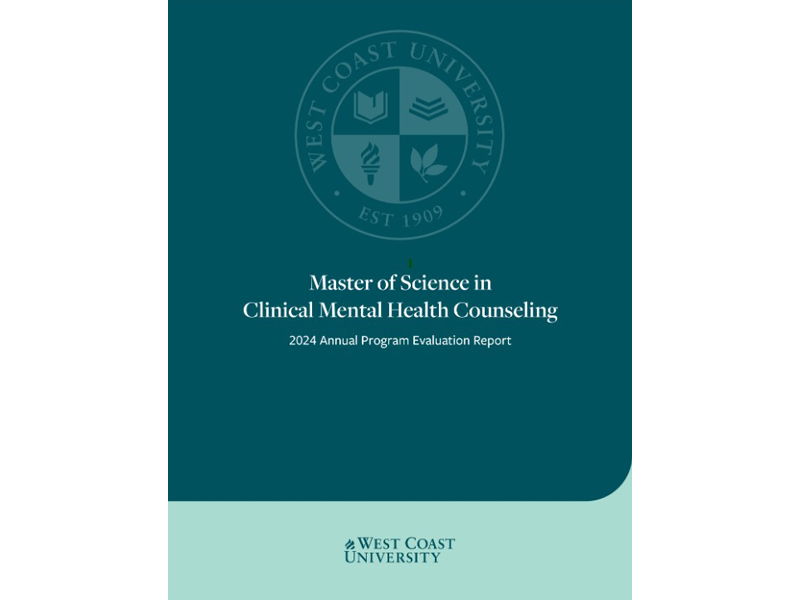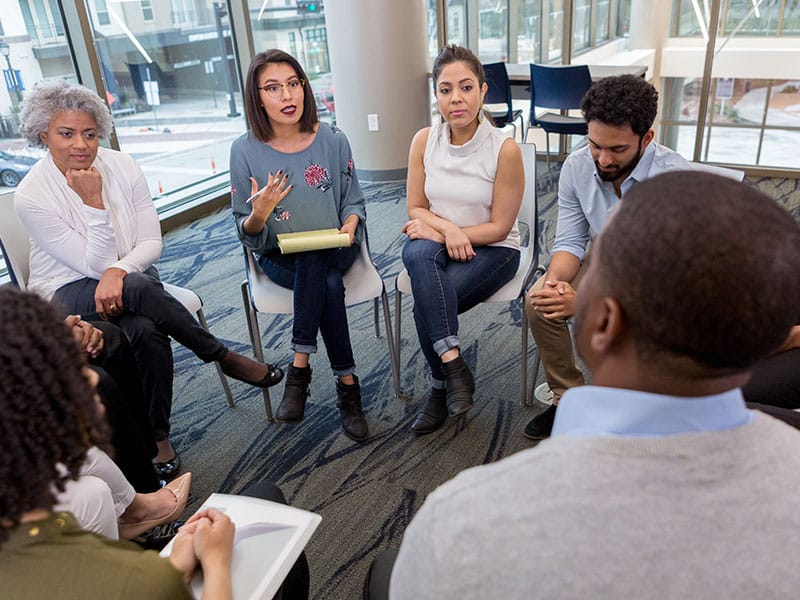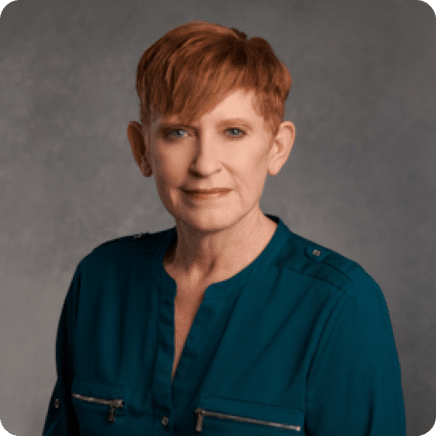
Master of Science in Clinical Mental Health Counseling Program
Learn how to help people cope, heal, and thrive through our online clinical mental health counseling program.
Apply Now

10 Weeks
10-week terms allow for 5 start dates throughout the year
29 Months
Finish the program in less than 2.5 years
60 Credits
Complete 60 credits to earn your degree
Program Highlights
CACREP-aligned program that has been designed to reflect professional standards
Seminars and round-table discussions on leading-edge topics provided by influential leaders in the field of counseling
Assistance with practicum/internship placements and career support services that extend beyond graduation
Request Info
- Flexible online and campus programs
- 65,000 alumni across the globe
- Experienced faculty and staff
Why Earn a Master’s in Clinical Mental Health Counseling?
Are you passionate about making a positive impact and empowering individuals to lead healthier lives? Consider our master’s program in clinical mental health counseling, designed for those eager to support clients dealing with challenges like anxiety, depression, addiction, and post-traumatic stress.
Counselors play a crucial role in guiding individuals, couples, families, and groups through various challenges. They evaluate clients, assess readiness for counseling, help clients understand factors influencing their mental health, and teach coping strategies.2,3
Our Master of Science in Clinical Mental Health Counseling program, approved by the Board of Behavioral Sciences in California, helps prepare you for a fulfilling counseling career with an innovative curriculum focusing on intersectionality, mental health advocacy, and holistic treatment through personalized connections.
Overview: MS in Clinical Mental Health Counseling Program
Program Details
We know you’re eager to make a difference, and that’s why we created a mental health counseling master’s program that you can complete in less than 2.5 years. Learn more about the program below.
Program Pace
Distance Education/Online
60 Credits
29 Months
6 Trimesters
Curriculum
| Course Number | Course Name | Total Credit Hours |
|---|---|---|
| Number | Name | Hours |
| CMHC 505 | Foundations of Clinical Mental Health and Counseling | 3 |
| CMHC 510 | Professional Orientation: Legal and Ethical Issues in Counseling | 3 |
| CMHC 515 | Counseling Theories and Practice | 3 |
| CMHC 520 | Crisis/Trauma Response and Intervention | 3 |
| CMHC 525 | Social and Cultural Foundations | 3 |
| CMHC 530 | Individual Counseling Skills and Practice w/ Immersive I | 3 |
| CMHC 535 | Human Growth and Development | 3 |
| CMHC 545 | Career and Lifestyle Assessment | 3 |
| CMHC 550 | Couples, Marriage, and Family Counseling | 3 |
| CMHC 560 | Research Design and Program Evaluation | 3 |
| CMHC 645 | Group Counseling and Practice | 3 |
| CMHC 650 | Addictions and Substance Abuse Counseling | 3 |
| CMHC 655 | Human Sexuality | 3 |
| CMHC 665 | Psychopathology | 3 |
| CMHC 670 | Individual Evaluation and Assessment | 3 |
| CMHC 683 | Contemporary Topics Advanced Skills, Theories and Ethics w/ Immersive II | 3 |
| CMHC 685 | Fieldwork Practicum | 3 |
| CMHC 690A | Fieldwork: Internship I | 2 |
| CMHC 690B | Fieldwork: Internship II | 2 |
| CMHC 690C | Fieldwork: Internship III | 2 |
| Total Credit Hours: | 60 | |
Tuition & Financial Aid
How Much Does the Master of Science in Clinical Mental Health Counseling Program Cost?
We know school is a substantial commitment. At WCU, we want to equip you with all the information you need to make the right decision for your future.
Our goal is to give you a clear understanding of Master of Science in Clinical Mental Health Counseling tuition costs so you can be well-informed as you navigate the application and enrollment process. To assist you in your decision, we provide a breakdown below of the Master of Science in Clinical Mental Health Counseling program costs at West Coast University.
We offer several financial aid options — including scholarships, grants, and loan access — to help support you through your studies. For more information about your financial support options, visit our financial aid page.
Estimated Cost of Attendance is comprised of both direct costs and indirect costs, as outlined in the charts below. The purpose of the Cost of Attendance (COA) is to provide students and families with an estimated cost to attend West Coast University. The COA includes both direct and indirect cost estimates and are categorized as follows: (1) Direct costs are paid directly to West Coast University and are shown separately for each program; (2) Indirect costs are not paid to West Coast University and are estimates students may use to budget expenses they may incur while attending school. While actual indirect costs may vary, West Coast University estimates these amounts based on the number of months in an academic year and whether students will live with parents or off campus.
Enrolling prior to April 1, 2024
Direct Costs
| Total Program Credits | 60 |
| Total Semesters | 6 |
| Total Cost (per credit) | $650.00 |
| Total Tuition Cost: | $39,000.00 |
| STRF Fee (Non-Refundable) 1: | $105.00 |
| Technology Fee 2 | $3,000.00 |
| Estimate for Program Supply Fees 3 | $400.00 |
| Total Program Costs (Texas/Miami): | $42,450.00 |
| Total Program Costs (California): | $42,555.00 |
Indirect Costs
| 8 Month Academic Year6 | ||||
| Prior to Fall 1 2025 | Starting Fall 1 2025 | |||
| with parents | off campus | with parents | off campus | |
| Federal Student Loan Fees | $220 | $220 | $220 | $220 |
| Living Expenses (Food & Housing) | $3,120 | $10,410 | $3,270 | $10,910 |
| Transportation | $2,160 | $2,160 | $2,220 | $2,220 |
| Miscellaneous Personal Expenses | $7,070 | $7,070 | $7,070 | $7,070 |
| Total | $12,570 | $19,860 | $12,780 | $20,420 |
1 Effective April 1, 2024, the Student Tuition Recovery Fund (STRF) assessment rate will be zero dollars and zero cents ($0.00) per one thousand dollars ($1,000) of institutional charges.
The State of California established the Student Tuition Recovery Fund (STRF) to relieve or mitigate economic loss suffered by a student in an educational program at a qualifying institution, who is or was a California resident while enrolled, or was enrolled in a residency program, if the student enrolled in the institution, prepaid tuition, and suffered an economic loss. Unless relieved of the obligation to do so, you must pay the state-imposed assessment for the STRF, or it must be paid on your behalf, if you are a student in an educational program, who is a California resident, or are enrolled in a residency program, and prepay all or part of your tuition.
You are not eligible for protection from the STRF and you are not required to pay the STRF assessment, if you are not a California resident, or are not enrolled in a residency program.
It is important that you keep copies of your enrollment agreement, financial aid documents, receipts, or any other information that documents the amount paid to the school. Questions regarding the STRF may be directed to the Bureau for Private Postsecondary Education, 1747 N. Market Blvd. Ste 225 Sacramento, CA 95834, (916) 431-6959 or (888) 370-7589.
To be eligible for STRF, you must be a California resident or enrolled in a residency program, prepaid tuition, paid or deemed to have paid the STRF assessment, and suffered an economic loss as a result of any of the following:
The institution, a location of the institution, or an educational program offered by the institution was closed or discontinued, and you did not choose to participate in a teach-out plan approved by the Bureau or did not complete a chosen teach-out plan approved by the Bureau.
You were enrolled at an institution or a location of the institution within the 120-day period before the closure of the institution or location of the institution or were enrolled in an educational program within the 120-day period before the program was discontinued.
You were enrolled at an institution or a location of the institution more than 120 days before the closure of the institution or location of the institution, in an educational program offered by the institution as to which the Bureau determined there was a significant decline in the quality or value of the program more than 120 days before closure.
The institution has been ordered to pay a refund by the Bureau but has failed to do so.
The institution has failed to pay or reimburse loan proceeds under a federal student loan program as required by law or has failed to pay or reimburse proceeds received by the institution in excess of tuition and other costs.
You have been awarded restitution, a refund, or other monetary award by an arbitrator or court, based on a violation of this chapter by an institution or representative of an institution, but have been unable to collect the award from the institution.
You sought legal counsel that resulted in the cancellation of one or more of your student loans and have an invoice for services rendered and evidence of the cancellation of the student loan or loans.
To qualify for STRF reimbursement, the application must be received within four (4) years from the date of the action or event that made the student eligible for recovery from STRF.
A student whose loan is revived by a loan holder or debt collector after a period of noncollection may, at any time, file a written application for recovery from STRF for the debt that would have otherwise been eligible for recovery. If it has been more than four (4) years since the action or event that made the student eligible, the student must have filed a written application for recovery within the original four (4) year period, unless the period has been extended by another act of law.
However, no claim can be paid to any student without a social security number or a taxpayer identification number.
2 Technology Fee includes student technical support, Office 365, blended and online course delivery/learning management system, mobile app, student portal technology and access, and required electronic course materials/software.
3 Program Fee covers the establishment, on-going management, scheduling, coordination, site visits, and any other expenses related to clinical activities and onsite intensives.
4 The purpose of the Cost of Attendance (COA) is to provide students and families with an estimated cost to attend West Coast University. The COA includes both direct and indirect cost estimates. Direct costs are paid directly to West Coast University and are shown separately for each program. Indirect costs are not paid to West Coast University and are estimates students may use to budget expenses they may incur while attending school. While actual indirect costs may vary, West Coast University estimates these amounts based on the number of months in an academic year and whether students will live with parents or off campus.
Enrolling after April 1, 2024
Direct Costs
| Total Program Credits | 60 |
| Total Semesters | 6 |
| Total Cost (per credit) | $650.00 |
| Total Tuition Cost: | $39,000.00 |
| STRF Fee (Non-Refundable) 1: | $0 |
| Technology Fee 2 | $3,000.00 |
| Estimate for Program Supply Fees 3 | $400.00 |
| Total Program Costs (Texas/Miami): | $42,450.00 |
| Total Program Costs (California): | $42,450.00 |
Indirect Costs
| 8 Month Academic Year6 | ||||
| Prior to Fall 1 2025 | Starting Fall 1 2025 | |||
| with parents | off campus | with parents | off campus | |
| Federal Student Loan Fees | $220 | $220 | $220 | $220 |
| Living Expenses (Food & Housing) | $3,120 | $10,410 | $3,270 | $10,910 |
| Transportation | $2,160 | $2,160 | $2,220 | $2,220 |
| Miscellaneous Personal Expenses | $7,070 | $7,070 | $7,070 | $7,070 |
| Total | $12,570 | $19,860 | $12,780 | $20,420 |
1 Effective April 1, 2024, the Student Tuition Recovery Fund (STRF) assessment rate will be zero dollars and zero cents ($0.00) per one thousand dollars ($1,000) of institutional charges.
The State of California established the Student Tuition Recovery Fund (STRF) to relieve or mitigate economic loss suffered by a student in an educational program at a qualifying institution, who is or was a California resident while enrolled, or was enrolled in a residency program, if the student enrolled in the institution, prepaid tuition, and suffered an economic loss. Unless relieved of the obligation to do so, you must pay the state-imposed assessment for the STRF, or it must be paid on your behalf, if you are a student in an educational program, who is a California resident, or are enrolled in a residency program, and prepay all or part of your tuition.
You are not eligible for protection from the STRF and you are not required to pay the STRF assessment, if you are not a California resident, or are not enrolled in a residency program.
It is important that you keep copies of your enrollment agreement, financial aid documents, receipts, or any other information that documents the amount paid to the school. Questions regarding the STRF may be directed to the Bureau for Private Postsecondary Education, 1747 N. Market Blvd. Ste 225 Sacramento, CA 95834, (916) 431-6959 or (888) 370-7589.
To be eligible for STRF, you must be a California resident or enrolled in a residency program, prepaid tuition, paid or deemed to have paid the STRF assessment, and suffered an economic loss as a result of any of the following:
The institution, a location of the institution, or an educational program offered by the institution was closed or discontinued, and you did not choose to participate in a teach-out plan approved by the Bureau or did not complete a chosen teach-out plan approved by the Bureau.
You were enrolled at an institution or a location of the institution within the 120-day period before the closure of the institution or location of the institution or were enrolled in an educational program within the 120-day period before the program was discontinued.
You were enrolled at an institution or a location of the institution more than 120 days before the closure of the institution or location of the institution, in an educational program offered by the institution as to which the Bureau determined there was a significant decline in the quality or value of the program more than 120 days before closure.
The institution has been ordered to pay a refund by the Bureau but has failed to do so.
The institution has failed to pay or reimburse loan proceeds under a federal student loan program as required by law or has failed to pay or reimburse proceeds received by the institution in excess of tuition and other costs.
You have been awarded restitution, a refund, or other monetary award by an arbitrator or court, based on a violation of this chapter by an institution or representative of an institution, but have been unable to collect the award from the institution.
You sought legal counsel that resulted in the cancellation of one or more of your student loans and have an invoice for services rendered and evidence of the cancellation of the student loan or loans.
To qualify for STRF reimbursement, the application must be received within four (4) years from the date of the action or event that made the student eligible for recovery from STRF.
A student whose loan is revived by a loan holder or debt collector after a period of noncollection may, at any time, file a written application for recovery from STRF for the debt that would have otherwise been eligible for recovery. If it has been more than four (4) years since the action or event that made the student eligible, the student must have filed a written application for recovery within the original four (4) year period, unless the period has been extended by another act of law.
However, no claim can be paid to any student without a social security number or a taxpayer identification number.
2 Technology Fee includes student technical support, Office 365, blended and online course delivery/learning management system, mobile app, student portal technology and access, and required electronic course materials/software.
3 Program Fee covers the establishment, on-going management, scheduling, coordination, site visits, and any other expenses related to clinical activities and onsite intensives.
4 The purpose of the Cost of Attendance (COA) is to provide students and families with an estimated cost to attend West Coast University. The COA includes both direct and indirect cost estimates. Direct costs are paid directly to West Coast University and are shown separately for each program. Indirect costs are not paid to West Coast University and are estimates students may use to budget expenses they may incur while attending school. While actual indirect costs may vary, West Coast University estimates these amounts based on the number of months in an academic year and whether students will live with parents or off campus.
Admission Requirements
A student applying for admission to the MSCMHC program at West Coast University must:
- Have obtained a bachelor’s degree from a regionally accredited institution. Overall, the last 60 semester units of the degree or program of study must meet a 3.0 minimum GPA.
- Submit a copy of official transcripts and/or International Transcript Evaluation, prior to the end of the add/drop period of the first term
- Provide a Statement of Purpose
- Provide two (2) professional letters of recommendation
- Complete the Interview Process
- Complete an enrollment agreement, consisting of program policies, costs, completion requirements, and other student obligations, if accepted into the program
West Coast University requires proof of English Proficiency. Applicants for whom English is not their primary language should refer to the University Admissions Requirements section of the catalog.
Conditional Admissions Requirements
Applicants with an undergraduate GPA of 2.79-2.99 may be considered for conditional admission after meeting the following admissions requirements:
- The applicant must provide a letter of intent.
- The applicant must be approved for admission following an interview with the Program Director/Dean.
- The applicant must satisfy program prerequisites.
- Have obtained a bachelor’s degree from a regionally accredited institution.
A student admitted under the conditional admissions pathway must achieve a cumulative GPA of 3.0 on all coursework attempted over the first semester (two terms). Students who meet this standard will be converted to a full admit status and will be subject to the standard Satisfactory Academic Progress requirement for the duration of their program. Students failing to meet this requirement by the end of the first semester (two terms) will be withdrawn from the university.
Students accepted under the conditional admissions pathway will be considered regular students and eligible for Title IV, if the student otherwise qualifies for funding, for the first semester of their program of study while completing the requirements for full admission to their program.
For more information on our program requirements, please visit our catalog.
CACREP

View the 2024 Master of Science in Clinical Mental Health Counseling Annual Program Evaluation Report
The 2024 Annual Program Evaluation Report for the Master of Science in Clinical Mental Health Counseling program presents data on program outcomes, assessment results, and continuous improvement efforts for the 2023–2024 academic year.
Clinical Placements

In our MS in Clinical Mental Health Counseling program, you will be required to complete 100 hours minimum of supervised clinical practicum and 600 hours of supervised internship that do not count toward the licensed professional counselor intern (LPCI) hours required within your state.
Our team can help you identify clinical sites that align with the practicum and internship requirements of our program. Not only will we assist with the process of obtaining clinical site approval, but we’ll also provide compliance training and general support for your clinical experiences.
We’re here to help you gain the hands-on experience you need to prepare yourself for a career in clinical mental health counseling!
Career Services
At WCU, we want to help put our students on the path to success. That’s why we offer one-on-one support to help them prepare for life after graduation.
Our Career Services team is here to provide you with career planning services, professional development workshops tailored for your field of study, and assistance finding job leads, including those that could help you fulfill the licensed professional counselor internship (LCPI) hours that are required for state licensure.1
Program Mission
The mission of the MS in Clinical Mental Health Counseling (CMHC)
program is to prepare students with the knowledge and skills needed to be culturally competent, trauma informed, and stalwart advocates for social justice ensuring equity, and access to effective and affirmative clinical mental health care for all individuals.
Program Vision
The MS in Clinical Mental Health Counseling (CMHC) program envisions cultivating the next generation of professional counselors through a compassionate and rigorous curriculum that focuses on strengths-based approaches. We aim to empower our students to become advocates for mental health, social justice, wellness, and emotional well-being for all.
Learning Outcomes
Upon successful completion of the program, and as required for licensure, the entry-level clinical mental health counselor will be able to:
- Evaluate counseling models to gain a broad and comprehensive understanding of individual and group assessments, testing, interviewing, and diagnostic processes for client lifespan development.
- Develop evidence-based practice methods to evaluate individual counseling interventions and program designs and procedures while considering strategies that are culturally and developmentally responsive focused on continuously improving the effectiveness of clinical practice.
- Deliver competent clinical counseling strategies to foster therapeutic relationships and work effectively and affirmatively with diverse individuals, couples, families, groups, and communities.
- Facilitate effective counseling relationships to provide affirmative, comprehensive, and culturally competent mental health services to clients from diverse backgrounds across the lifespan and as members of specialized practice and interprofessional teams.
- Practice a professional identity to prioritize ethical and effective practice as a critical pathway for the healing, empowerment, and the emotional and mental well-being of clients, and to build counseling relationships from a strength-based, intergenerational, trauma-informed perspective.
- Act as a social justice advocate to serve communities in various capacities, contributing positively and effectively to well-being and positive development, and informing advocacy in counseling decision-making as part of career development.
Featured Faculty

Colleen R. Logan, PhD, LPC-S
Dean/Program Director, Counseling
Dr. Colleen R. Logan is the Dean of the Master of Science in Clinical Mental Health Counseling program at West Coast University. Dr. Logan is a past President of the American Counseling Association and brings decades of experience in clinical counseling and administrative leadership within the higher education space.
At the University of Houston-Victoria, Argosy University, Walden University, and Fielding Graduate University, Dr. Logan has held various leadership positions including Professor, Vice President of Academic Affairs, and Associate Dean of the School of Psychology and Behavioral Sciences. She has also held the title of Associate Professor at Southern Methodist University in the Department of Conflict Resolution and Counseling, as well as Program Director of the Counseling program at Barry University. In each of these positions, Dr. Logan has successfully led efforts to obtain CACREP accreditation for both master’s and doctoral programs.
Dr. Logan graduated from the University of Virginia with a degree in Counselor Education in 1994. She currently holds her LPC license as a professional counselor and supervisor in the state of Texas.
FAQs
What kind of work can I do as a mental health counselor?
Mental health counselors treat individuals, couples, families, and groups, helping them learn how to overcome a variety of mental health issues and conditions such as anxiety, depression, stress, grief, post-traumatic stress, addiction, relational conflicts, and more. The mental health counselor’s responsibilities include evaluating clients and assessing their readiness for counseling, helping clients understand the issues that affect their mental health, and helping them learn coping strategies that they can implement into their day-to-day lives.3,4
Where do mental health counselors work?
Mental health counselors can work in a variety of environments, including:
- Outpatient mental health and substance abuse centers
- Residential mental health and substance abuse facilities
- Individual and family service agencies
- Hospitals
- Private practice
- Employee assistance programs (EAPs)
- Prisons
- Government facilities2,3
What is CACREP?
The Council for the Accreditation of Counseling and Related Educational Programs (CACREP) accredits counseling programs and educational content in a variety of specialization areas at the master’s and doctoral levels. The standards for CACREP accreditation are rigorous for courses and clinical experiences. CACREP is recognized as an accreditor by the Council for Higher Education Accreditation (CHEA).
Is it common for a program not to have CACREP accreditation?
We cannot say if it is common. We can only say that when a program is new it cannot be accredited by CACREP initially or prior to beginning the program. The program has to actively seek out CACREP accreditation, and CACREP requires evidence that the program and its students meet specific requirements during the accreditation process. This means that accreditation cannot be granted prior to the program being offered.
Is the MS in Clinical Mental Health Counseling program at WCU CACREP-accredited?
No. CACREP, and most other programmatic accreditors do not accredit a program prior to the program starting. CACREP requires evidence that the program and its students meet specific requirements during the accreditation process. The MS in Clinical Mental Health Counseling program curriculum is CACREP-aligned and the program will submit its CACREP self-study once the first group of students enters fieldwork, in accordance with CACREP accreditation procedures. The self-study is an important step in a program’s pursuit of CACREP accreditation.
What is the status of WCU obtaining CACREP accreditation for this program?
The program’s accreditation application is underway, and the current projected timeline reflects that the program’s self-study would be completed and submitted to CACREP in the Summer of 2025, which aligns with when the first cohort of students enters fieldwork, in accordance with CACREP accreditation procedures. The self-study is a significant part of the accreditation process. The self-study will be followed by a required site visit that is expected to take place in early 2026, which corresponds to the first cohort of students’ enrollment the final term of the program. We expect that the self-study will be reviewed and considered by the CACREP Board in July of 2026.
How does this affect students enrolled before that time?
Please note that according to CACREP, “students in a program seeking accreditation shall be considered graduates of a CACREP program if they receive their degree within eighteen (18) months prior to when accreditation is conferred, and if the program can verify that the student completed the CACREP program requirements”.
How long does it take to become a mental health counselor?
Our MS in Clinical Mental Health Counseling program can be completed in as few as 29 months; however, every state requires that a certain number of registered internship hours be completed after graduation and before you can apply for your license. To provide a frame of reference, in Texas, 3,000 hours of supervised experience are required prior to licensure.4 Be sure to research the licensure requirements for your state.
What can I expect during the program? Is it a lot of work?
The program is designed to be rigorous to help you work towards obtaining licensure with confidence. However, courses are also designed to be engaging, using innovative tools such as original video content, roundtable discussions with leading industry professionals, virtual simulations, mobile-friendly study tools, and more.
What kind of support will I receive in the program?
At WCU, we believe in giving you all the tools to help you succeed. You’ll have 24/7 access to your online lectures and coursework, WCU’s online library, and mobile-friendly learning materials such as videos, audio books, adaptive quizzes, and more. You will be able to interact regularly with the program dean and associate dean. Additionally, our Career Services team is available to assist you with career planning, professional development, and assistance with job placements.
Is financial aid available?
You may be eligible for financial aid, scholarships, and/or grants, depending on your qualifications. Learn more about your financial options5.

West Coast University is accredited by WASC Senior College of University Commission (WSCUC), an institutional accrediting body recognized by the U.S. Department of Education (USDOE) and the Council on Higher Education Accreditation (CHEA). 1080 Marina Village Parkway, Suite 500 Alameda, CA 94501, (510) 748- 9001/ https://www.wscuc.org/

The California Board of Behavioral Sciences (BBS) has determined the Master of Science degree in Clinical Mental Health Counseling at West Coast University includes coursework that meets the statutory requirements for licensure as a Licensed Professional Clinical Counselor (LPCC) and registration as an Associate Professional Clinical Counselor.
1WCU provides career guidance and assistance but cannot guarantee employment.
2Bureau of Labor Statistics, U.S. Department of Labor, Occupational Outlook Handbook, Substance Abuse, Behavioral Disorder, and Mental Health Counselors
3Medical News Today (Healthline Media), “How can mental health counselors help?” Mar. 5, 2025
4Texas Administrative Code, Title 22, Part 30, Chapter 681, Subchapter C, Rule §681.92
5Financial aid and scholarships are available for those who qualify.